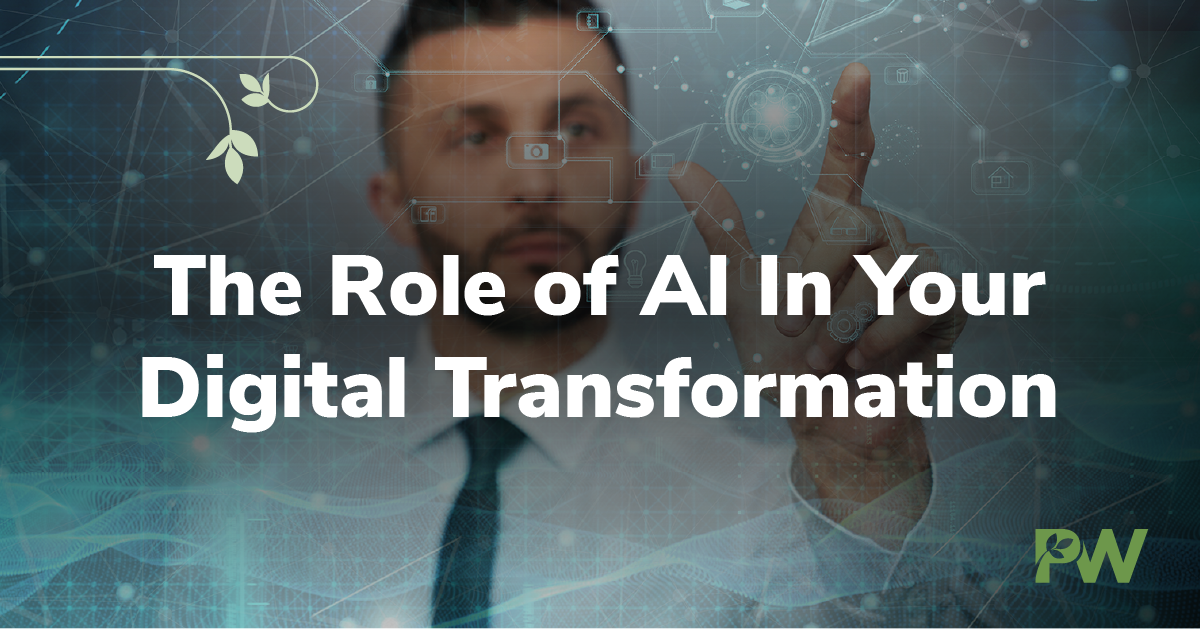It’s hard to avoid the topic of Artificial Intelligence (AI) these days. From industry reports to LinkedIn discussions, companies and employees are abuzz with talk of how advancements in AI technology are transforming the way companies do business.
The concept of AI isn’t new, but it’s the introduction of generative AI, such as ChatGPT, that has businesses excited. According to research by McKinsey, 40% of enterprises plan to invest in generative AI in the near future.
If a digital transformation is in your future, it’s imperative to understand the role AI can—and should—play in your transformation.
What Is Generative AI, and How Is It Used?
Like its name implies, generative AI is artificial intelligence that is capable of generating text, images, code, and other media.
Generative AI delivers the most value to companies via four main areas:
-
- Customer operations. Current data shows that the most common implementation for AI is customer service, with 56% of businesses using AI for customer service-related tasks.
- Marketing and Sales. Generative AI can produce marketing collateral, SEO content, and even write sales emails. ChatGPT, for example, can create an entire marketing campaign if given the correct prompts.
- Software Engineering. Within the high-tech industry, generative AI is used in software development to quickly generate code,
- Research & Development. One emerging use case for AI is in R&D. Life sciences companies, for example, use generative AI to create 3D designs and products, such as candidate molecules or electrical circuits, that help accelerate the drug development process.
Essentially, every role in your organization can take advantage of the power of generative AI in accomplishing their tasks and creating more meaningful experiences for customers.
AI and the Customer Experience
One of the most impactful roles AI plays in a digital transformation centers around the customer experience.
Businesses can leverage AI in a number of ways to improve the customer experience, including:
-
- Personalization can take many forms, from targeted emails to product recommendations to special offers on a customer’s birthday. Personalization has become so important to consumers that 76% expect it, and 78% are more likely to make repeat purchases from companies who personalize.
- AI-powered chatbots can provide instant support to customers, engaging them in conversations that can rival human customer service interactions. Chatbots can answer questions, provide product information, or direct them to pages online, helping provide a positive customer experience while freeing up customer support for more specific inquiries or issues.
- Use AI to direct customers to the appropriate service department, such as billing, returns, or tech support, to expedite the time to resolution and reduce friction in the customer experience.
- Predictive analytics. Leveraging AI-powered analytics can provide greater insight into the customer’s needs, allowing you to make data-driven decisions and recommendations. For example, AI can be used to help facilitate the reorder process by using data to determine when a customer will likely need to reorder, then automatically a reorder reminder email.
From an operations standpoint, AI can also help improve customer service team productivity by automating or handling specific tasks. This frees up agent time to handle more calls or address specific requests. According to one study, generative AI helped increase issue resolution by 14% each hour and reduce agent time per issue by 9%.
Salesforce AI Solutions
If your digital transformation includes Salesforce, consider some of the AI solutions it has introduced to the Salesforce suite of products:
-
- Salesforce Einstein, Salesforce’s comprehensive AI for CRM. It includes language processing, machine learning, and predictive analytics for customer insights and predictive analytics.
- Einstein Analytics, an analytics-based AI that uses machine learning to analyze data from a variety of internal and external sources.
- Einstein Language combines Natural Language Processing with AI to analyze customer interactions in order to provide more personalized customer experiences.
- Einstein Vision helps classify images, which can be useful for tasks such as part identification or brand recognition.
- Einstein Discovery analyzes data and provides actionable insights based on that data
- Inbox AI helps sales professionals manage their email inboxes, identifying action items, drafting responses, and handling other manual tasks.
- Marketing Cloud Intelligence (formerly known as Datarama) is used with Marketing Cloud to provide AI insights into marketing performance data to better tailor marketing campaigns.
- Einstein Intent uses AI to identify the intent of user data, and then categorize it for follow-up by customer service and marketing professionals.
Find out how incorporating AI tools into your digital transformation can help your enterprise become more agile, competitive, and customer-centric.
Download our latest infosheet, Top Considerations for Implementing AI Into Your Digital Transformation, or fill out our form to get started.
